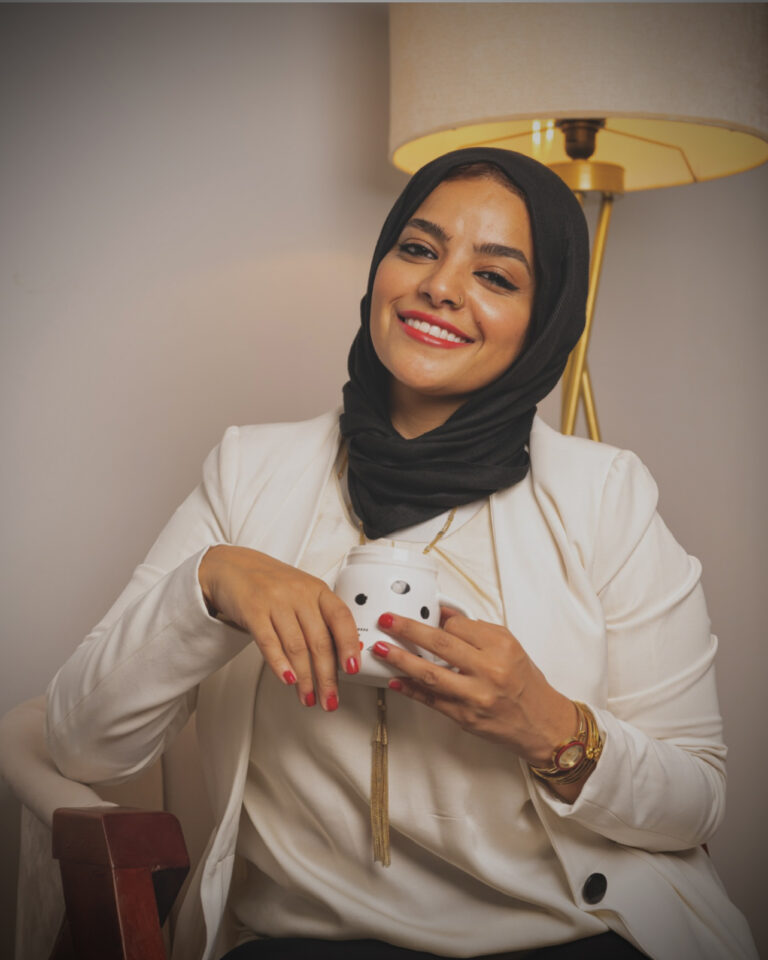Dubai – Ali Alzakary
In a world where health meets passion and science blends with the senses, Dr. Amani Adam chose an unconventional path — from pharmacy to coffee. She didn’t just drink it; she studied it like a medicine, uncovering its complex chemistry and its effects on mood and body.
Her journey began with a simple question: Why does coffee sometimes make me feel good and other times uneasy? From that question emerged a passion for understanding coffee scientifically, transforming it from a daily beverage into a tool for enhancing mental and physical well-being.
In this exclusive interview with Qahwa World, Dr Amani shares how she brings together science and art in every cup—redefining coffee not as a quick stimulant, but as a balanced and mindful lifestyle.
Join us as we explore how every sip can become a step toward wellness.
You began your career as a pharmacist, then turned toward coffee as a means of promoting health. What led to this bold shift, and how did your medical background influence your passion for understanding coffee’s effects?
The transformation began when I realised that although coffee was my favourite drink, it sometimes affected my health and mood. Instead of giving it up, I decided to explore why through a scientific lens rooted in my pharmacy background. That led me to view coffee entirely differently, as a complex chemical compound that can be understood and optimised. That’s where my passion for linking coffee and health was born.
You faced a major challenge when people told you that you were “too old” to start over at thirty. What helped you turn that doubt into motivation, and how did your MBA shape your vision of new opportunities?
Honestly, that statement was a turning point in my life. Instead of discouraging me, it made me more determined to change. I decided to pursue an MBA because I wanted to combine science with leadership and strategic vision. The degree helped me see opportunities differently and understand how to turn passion into a tangible project with real impact.
Your story is truly inspiring for those thinking about changing their career path. What advice would you give someone hesitant to reinvent themselves, based on your experience?
Don’t wait for the perfect moment — it never comes. Change is always difficult at first, but persistence makes it possible. When I started, very few encouraged me; most thought it was too hard or that no one cared about coffee. But my background in market analysis helped me see the future of coffee in the Middle East as one of the fastest-growing sectors. My goal was to contribute to spreading knowledge in this field. The key is to start small, keep learning, and keep moving. Every challenge is a new opportunity for growth, and the most important thing is to believe in yourself even when others doubt you.
You describe your approach as “enhancing health and mood in every sip.” How do you define functional coffee, and what makes it more than just a stimulating drink?
Functional coffee, for me, is coffee that doesn’t just give us energy but also supports our physical and mental health. It’s coffee prepared with care — from the choice of beans to the brewing method — and enriched with natural elements that boost its nutritional value. Why not make a daily drink a source of wellness? It’s a balance between flavor and function — a lifestyle, not just a beverage.
Many people see coffee merely as a quick energy boost. How do you work through your content to change this perception and present coffee as a tool for daily well-being?
I try to present coffee from a simple, scientific, and engaging perspective. I explain how it can improve mood, focus, and general well-being when consumed mindfully. I share practical tips such as the best time to drink coffee or which type suits different lifestyles and health conditions. I receive many questions about chronic issues like diabetes, hypertension, or digestive problems, and I tailor recommendations to each person’s needs—with great positive feedback.
What are the most common misconceptions about coffee and health that you encounter, and how do you help people make more informed choices?
One of the most common misconceptions is that coffee “harms your health” or “causes dehydration”. The truth depends on the quantity, quality, and preparation method. I always emphasise that coffee can be very beneficial if understood and consumed properly.
You hold two certifications in coffee evaluation. How have they influenced you and placed you at the intersection of science and art in the coffee world?
These certifications completely changed my perspective on coffee. I learnt that evaluation is not only about taste but also about understanding chemical composition, aroma, and flavor. I found myself at the intersection of science and art — where scientific knowledge becomes a sensory experience.
How have these certifications helped you connect flavours with health benefits, such as choosing beans that enhance mood?
They’ve allowed me to identify coffee beans rich in compounds that boost energy or improve mood, such as certain Arabica varieties with high antioxidant levels. I now see coffee as a way to improve mental well-being, not just as a stimulant.
You’re currently pursuing your Q Grader certification. What have you learnd about the relationship between coffee quality (flavour and aroma) and mental health?
I’ve learned that good coffee is not just about refined flavor; it’s a complete experience that starts with aroma and ends with how it makes you feel. High-quality aromas and flavors truly affect the nervous system and mood positively. Many people avoid coffee because they associate it with bitterness — simply because they haven’t discovered the varieties and brewing methods that suit them best.
You launched a digital platform focused on healthy coffee content. What inspired this step, and how do you choose the topics you share with your audience?
I started the platform to share the knowledge I wished I had when I first began. I choose topics based on people’s actual needs — caffeine balance, pre-workout coffee, or its relation to sleep and mood — and I always try to make the information accessible and engaging. I constantly follow the latest research and coffee market trends to translate them into simple, practical insights for my audience.
How do you balance scientific accuracy with simplicity and engagement on social media?
I rely on simplifying information without compromising accuracy. I use a friendly tone, add humor or personal stories, and make science part of everyday life rather than a dry subject.
How do you see the future of functional coffee in the Gulf region, and what global trends in this field excite you the most?
I see a very promising future for functional coffee in the Gulf, especially with the growing awareness of healthy lifestyles. The global trend that excites me most is blending coffee with natural supplements such as probiotics or herbs that enhance energy and mood. I believe the future belongs to coffee that nourishes both body and mind.
The post Dr. Amani Adam: Coffee Can Be a Remedy—If We Understand It Well appeared first on Qahwa World.





